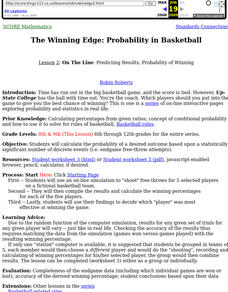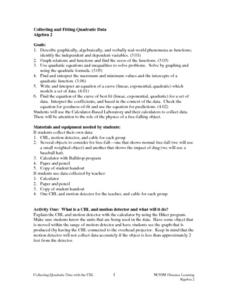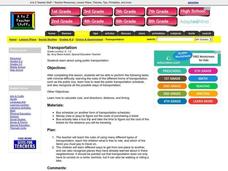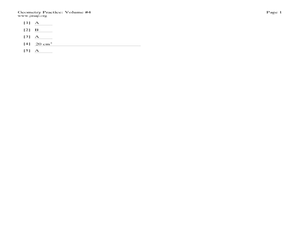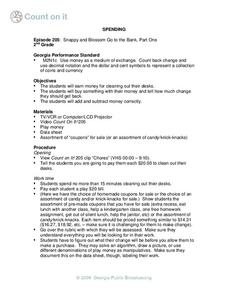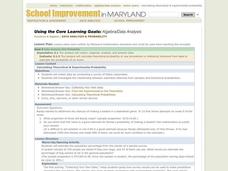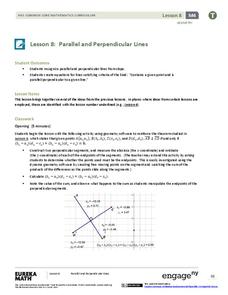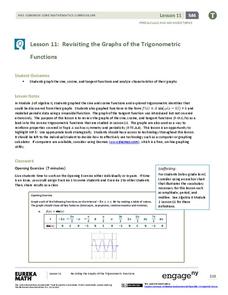Curated OER
The Winning Edge: Probability in Basketball: Lesson 2
Students calculate the probability of a desired outcome based upon a statistically significant number of discrete events (i.e. endgame free-throw attempts). They participate in an online simulation of basketball free throws.
Curated OER
Collecting And Fitting Quadratic Data
Students investigate the concept of using quadratic data to plot coordinates on a plane. They also apply the quadratic formula for a variety of problems with the help of a graphing calculator to draw the parabola for given coordinates.
Curated OER
Malnourishment and Poverty
Learners discover how poverty impacts people in many developing countries. In this Student Voices against Poverty lesson, students calculate data on numbers of children suffering from Vitamin A deficiency and numbers of people hungry to...
Curated OER
Percents and Discounts
Learners convert between decimals and percents. In this algebra instructional activity, students define percent as it relates to sales and tax. They calculate the percents of number using multiplication.
Curated OER
Slavery
Learners trace the routes of escaping slaves on their journey north by calculating the mileage each one walked and define and use accurately the term Underground Railroad. They read The Drinking Gourd by Jeanetter Winter.
Curated OER
Slavery and the Underground Railroad
Young scholars examine a map of the Underground Railroad. They trace the slaves journeys and calculate the mileage. They write an essay about the risks and penalties one faced in escaping. They work together in groups to name...
Curated OER
Transportation
Students examine the different types of transportation. They practice reading a bus schedule and identifying which direction the bus is traveling. They also calculate cost of the ride and how long the ride is.
Curated OER
Understanding Computer Images
Ninth graders explain differences between bitmapped images and vector images. They calculate pixels and transpose the raw file size to bits, bytes, and kilobytes. They compare formats for displaying images on a Web page.
Curated OER
Five Volume of Pyramids Problems
In this pyramids worksheet, young scholars calculate the volume of pyramids in four multiple choice and one free-response problem. The solutions are provided.
Curated OER
What Are Maps For?
Middle schoolers create a story about a problem someone could have which could be solved by the use of a map. They complete a worksheet that guides them through the features of a map of Chicago. Then they calculate story problems using...
Curated OER
Immigration in the United States
Pupils examine the reasons why people leave their country to live in another. In groups, they use print and electronic resources to answer questions about where immigrants came from during different time periods and advice given to...
Curated OER
Working Watermelon
You're going to wish you had a watermelon for this lesson! Class members read about watermelons and make a salad in class to sample. They also perform estimates, measurements and calculations on a watermelon. They predict what percentage...
Curated OER
Spending
Student explore the value of money. In this addition and subtraction instructional activity, 2nd graders earn "money" for classroom jobs and spend it in the classroom. Students practice how to add prices and calculate change. This...
Curated OER
Calculating Theoretical & Experimental Probability
Students explore the concept of experimental and theoretical probability. In this experimental and theoretical probability lesson, students collect data by conducting a survey of their classmates. Students compare their data and discuss...
Curated OER
Two Digit Addition Without Regrouping
No regrouping required. Hone basic subtraction skills with 20 problems. Learners subtract double-digit numbers.
EngageNY
Estimating Probability Distributions Empirically 1
What if you don't have theoretical probabilities with which to create probability distributions? The 11th installment of a 21-part module has scholars collecting data through a survey. The results of the survey provide empirical data to...
EngageNY
Parallel and Perpendicular Lines
Use what you know about parallel and perpendicular lines to write equations! Learners take an equation of a line and write an equation of a line that is parallel or perpendicular using slope criteria. They then solve problems to...
EngageNY
Revisiting the Graphs of the Trigonometric Functions
Use the graphs of the trigonometric functions to set the stage to inverse functions. The lesson plan reviews the graphs of the basic trigonometric functions and their transformations. Pupils use their knowledge of graphing functions to...
Curated OER
Pythagorean Theorem
Reinforce the use of the Pythagorean theorem with this problem solving lesson. Middle schoolers use the Pythagorean theorem to solve word problems. They work in pairs to find the answers to the problems, and then explain how they got...
Curated OER
Exploring Geometry on the Sphere
In this geometry worksheet, students define important vocabulary dealing with circles. They measure cricles to the nearest degree. There are 11 word problems to be solved.
Illustrative Mathematics
Finding an Unknown Angle
Teach your class how to apply their knowledge of geometry as they explore the unknown. In order to find an unknown angle, learners must understand that rectangles have four interior right angles, that right angles have 90 degrees, and...
Curated OER
Building a Quadratic Function Form
Comparing the movement of graphs geometrically when small changes are made to the parent function motivates this collaborative discussion on the transformations of functions to their various forms. Vertical and horizontal shifts due to...
Curated OER
Astronomical Scales
Students describe the different units of measurement. In this space science lesson, students calculate astronomical distances using a scale. They explain the significance of using scientific notation in expressing very small or very...
Curated OER
Fractions to Percents
In this percent worksheet, learners problem solve and calculate how to change ten fractions into percents. Students share their answers with their classmates.


